|
|
|
Sort Order |
|
|
|
Items / Page
|
|
|
|
|
|
|
| Srl | Item |
| 1 |
ID:
147226
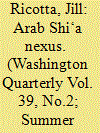

|
|
|
|
|
| Summary/Abstract |
The dramatic execution of prominent Saudi Shi‘i11. The words Shi‘a and Shi‘i in this article will follow their grammatical function in Arabic, where Shi‘i is the adjective and Shi‘a is the collective noun.View all notes Sheikh Nimr al-Nimr on January 6, 2016, spurred the official breakdown of Iran–Saudi Arabia relations. Other Arab countries, including Bahrain, have followed suit in breaking relations with Iran, which has only added to the now openly hostile sectarian regional environment.22. Ian Black and Saeed Kamali Deghan, “Bahrain, Sudan and UAE follow Saudis in diplomatic action against Iran,” The Guardian, January 4, 2016, http://www.theguardian.com/world/2016/jan/04/bahrain-cuts-diplomatic-ties-with-iran-in-row-over-saudi-execution-of-shia-cleric.View all notes As these sectarian tensions reach an all-time high in the region, the precarious status of Arab Shi‘a is at the very heart of this phenomenon. In Iraq, Saudi Arabia, Bahrain, and more recently Yemen, Arab Shi‘a have often been assumed to be vaguely Iranian influenced, explicitly backed by Iran, or even Iranians masquerading as Arabs.
|
|
|
|
|
|
|
|
|
|
|
|
|
|
|
|
| 2 |
ID:
147223
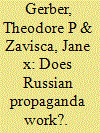

|
|
|
|
|
| Summary/Abstract |
Since the onset of the Ukraine crisis, the Russian government has stepped up efforts to promote a narrative it first introduced in the mid-2000s regarding the faults of the United States and the West; the dangers of institutions associated with democracy, such as protests and NGOs; and the superiority of Russian values and institutions. This narrative comes from official statements, diffuses via government-orchestrated Russian mass media as well as innovations such as internet “troll farms,” and is directed at both domestic and international audiences. Domestically, the arguments seek to legitimize the Putin regime, garner support for its policies, and demonize its critics. Internationally, they are part of a larger effort to project Russian “soft power,” sow doubts and uncertainty within the NATO alliance, weaken public support for policies countering Russian aggression in Ukraine, and solidify the allegiances of Russia's allies in former Soviet republics whom Russia considers part of its natural sphere of influence.
|
|
|
|
|
|
|
|
|
|
|
|
|
|
|
|
| 3 |
ID:
147224
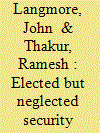

|
|
|
|
|
| Summary/Abstract |
Many of the pressing policy challenges confronting the world's countries and peoples—climate change, pandemics, food and water scarcity, terrorism, financial meltdown—are international in origin and nature, global in scope and effects, and require concerted multilateral action led by the major powers. However, the responsibility for making policy and the authority to mobilize the requisite coercive resources to tackle the threats remain vested in sovereign states. Absent a world government, the order, stability, and predictability in international transactions comes from global governance operating as a patchwork of authority structures which produce generally adhered-to norms to regulate behavior, and layers of mechanisms to punish noncompliance.
|
|
|
|
|
|
|
|
|
|
|
|
|
|
|
|
| 4 |
ID:
147219


|
|
|
|
|
| Summary/Abstract |
Candidate Barack Obama pledged in 2008 to end the Bush administration's heavy military deployments, but not to end the war against al-Qaeda and its associates. He said that as President he would keep a small residual force in Iraq to target al-Qaeda remnants, and promised to “tak[e] the fight to al-Qaeda in Afghanistan and Pakistan,” a goal that required, among other things, “more troops, more helicopters, more satellites, more Predator drones in the Afghan border region.
|
|
|
|
|
|
|
|
|
|
|
|
|
|
|
|
| 5 |
ID:
147225


|
|
|
|
|
| Summary/Abstract |
Saudi Arabia's King Abdullah died the night of January 23, 2015. The king, who was 91, had ruled the kingdom for two decades. After then-King Fahd suffered a stroke in 1995, Abdullah became the country's de facto ruler, and Abdullah was formally appointed king when his predecessor died in 2005. Ten years later, shrouded in a simple white cloth, King Abdullah was buried in an unmarked grave the same day he died—in line with Wahhabi Islamic teachings. The same day, Abdullah's half-brother Salman became the new king, and named his own brother, Muqrin, crown prince and his nephew, Muhammad bin Nayef, deputy crown prince. Later that spring, in April, Muqrin was replaced by Muhammad bin Nayef as crown prince. Meanwhile, the king's young son, Muhammad bin Salman, was appointed new deputy crown prince.
|
|
|
|
|
|
|
|
|
|
|
|
|
|
|
|
| 6 |
ID:
147221
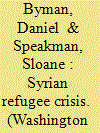

|
|
|
|
|
| Summary/Abstract |
The Syrian civil war has spawned a host of evils. Perhaps 400,000 Syrians have died in the carnage, and regional powers like Iran and Saudi Arabia treat it as a proxy war. Terrorist groups like the Islamic State seem to delight in creating new horrors for those who fall into their clutches, and use Syria as a base to expand in the Middle East, attack Europe, and inspire terrorists around the world. Syria’s problems, however, are also the world’s problems, and no problem is more immediate than the country's refugees.
|
|
|
|
|
|
|
|
|
|
|
|
|
|
|
|
| 7 |
ID:
147220
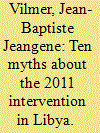

|
|
|
|
|
| Summary/Abstract |
Five years after the 2011 international military intervention, Libya is still undergoing a violent post-Muammar Gaddafi transition. Between August 2014 and December 2015, the country has been divided between two rival governments: one in the northeast in Tobruk that has been recognized by the international community yet is impotent, and a second “Islamist” government in the capital Tripoli in the northwest. In December 2015, after fourteen months of UN-sponsored dialogue, the Skhirat Agreement led to the creation of a Presidential Council. Functioning as the head of state, it has been located in a navy base near Tripoli since March 30, 2016, with Faiez Serraj, a former member of the Tobruk Parliament, as its head.
|
|
|
|
|
|
|
|
|
|
|
|
|
|
|
|
| 8 |
ID:
147227


|
|
|
|
|
| Summary/Abstract |
When the Houthi rebels took control of Yemen's capital, Sanaa, in September 2014, Arab Gulf officials and Western pundits claimed that Iran was aiming to export its revolutionary ideology and establish a Shia empire throughout the Middle East.11. Ali Mamouri, “Leaked Cables Show Gulf Leery of Shiite Expansion,” Al-Monitor, June 26, 2015, http://www.al-monitor.com/pulse/originals/2015/06/gulf-fears-shiite-expansion-wikileaks-saudi-arabia-iran.html.View all notes They claimed that Iran was doing so by backing, perhaps even controlling, the Shia Houthis. The Houthi takeover came at a critical point for the region: Tehran was in the midst of negotiations to resolve the crisis surrounding its nuclear program. The resulting deal provided Tehran with sanctions relief and removed some of the barriers to Iran's reintegration into the international community. Some already wary Gulf Arab states viewed the success of the talks as an end to Iranian isolation, with the country fixing its broken ties to the West and reasserting itself as a top regional power.
|
|
|
|
|
|
|
|
|
|
|
|
|
|
|
|
|
|
|
|
|